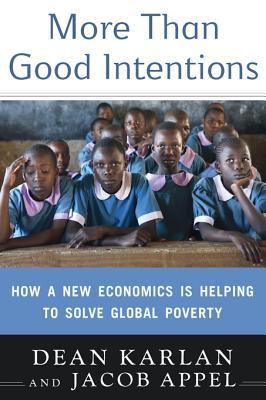
More Than Good Intentions
How a New Economics Is Helping to Solve Global Poverty
کتاب های مرتبط
- اطلاعات
- نقد و بررسی
- دیدگاه کاربران
نقد و بررسی

January 10, 2011
Karlan, a behavioral economist, and Appel, an aid worker, use psychological insights and empirical studies to assess and trouble-shoot development initiatives (especially the ballyhooed microcredit movement, to which they devote several sympathetic but critical chapters). They focus on small fixes with outsized payoffs: "commitment" savings accounts that make depositors accumulate a fixed amount before they can withdraw; well-side chlorine dispensers to purify water; paying parents to take kids for checkups; increasing the application rate to a microloan program by, yes, putting photos of hot chicks on the brochure. The authors write in an engaging prose tinged with Freakonomics-style cutesiness—"It hadn't dawned on me that hookers' prices could be a topic for serious economic research"—and illustrated with Appel's vivid reportage on underdevelopment in Ghana. Their program of tweaking spending and saving behavior (sending text messages reminding individuals to save money each month, for example) can seem faddish and insufficient, given the vast needs of poor countries; still, theirs is an enlightening and optimistic take on smartening up development aid.

January 1, 2011
Karlan (Economics/Yale Univ.), president of the nonprofit Innovations for Poverty Action, and his IPA collaborator Appel take a hard look at the realities of fighting poverty effectively.
Their concern has been to apply standard research methods—random sampling, control groups, statistical analysis, etc.—to evaluate different approaches and promote the most promising. They focus on case studies from around the world to illustrate how overlooked small details frequently make the difference between the success and failure of a project. While economists argue the relative merits of the traditional approach, which analyzes potential costs and benefits, and behavioral economists point to examples that illustrate how humans are frequently inconsistent and apparently irrational, Karlan and Appel cut to the chase by looking at the nuts-and-bolts of real situations. The authors show that despite their current popularity, microcredit programs are not necessarily the best way to support the efforts of Asian and African women who run small-scale entrepreneurial operations. Millions of dollars are pouring in to these programs from donors who are led to believe that they are helping particular individuals, while the truth is that the money they contribute goes directly to intermediary microlenders who service the loans. They charge interest rates that vary from 10 to 120 percent APR and cover their risk by forcing borrowers to join groups that are collectively responsible for any member default. The authors discovered that not only were charitable funds being misdirected, but many of the borrowers were forced to take rotating high-interest loans to cover exigencies because savings accounts and insurance were not available to them.
Karlan and Appel write that their goal is "to speak directly to readers, to lead them into some corners of the world they might not otherwise encounter, and bring them face-to-face with the people who populate those places." They have succeeded admirably, as both advocates and analysts.
(COPYRIGHT (2011) KIRKUS REVIEWS/NIELSEN BUSINESS MEDIA, INC. ALL RIGHTS RESERVED.)

November 15, 2010
What does it take to fight global poverty? More money? Better intentions? Actually, Yale economist Karlan and field researcher Appel instead advocate making small but indelible changes in banking practices, health care, and more to improve the lives of the poor. And they're not armchair pedants; they traveled the world to get the ideas furnished in this book. Good work for informed readers.
Copyright 2010 Library Journal, LLC Used with permission.

























دیدگاه کاربران